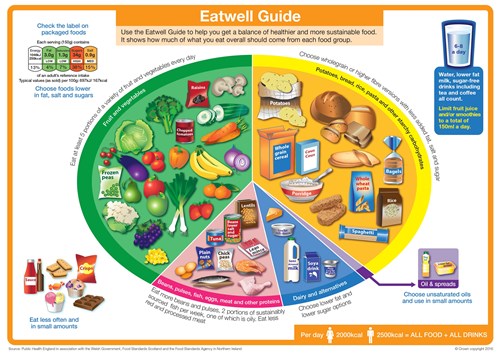Healthy Eating
The Eatwell Guide
Eating well and staying hydrated are key to staying healthy. A good diet keeps you active and improves both physical and mental health. If you need help with eating healthily, managing your weight, or cooking at home, support is available.
The Eatwell Guide suggests:
- Eat at least 5 portions of fruit and vegetables daily.
- Base meals on high-fibre starchy foods like potatoes, bread, rice, or pasta.
- Include some dairy or alternatives (like soya drinks).
- Eat beans, pulses, fish, eggs, meat, and other proteins.
- Choose unsaturated oils and spreads in small amounts.
- Drink plenty of fluids (6 to 8 glasses a day).
Limit foods and drinks high in fat, salt, and sugar.
Variety is key: Choose different foods from the 5 main food groups to get a range of nutrients. Many people consume too many calories, saturated fat, sugar, and salt, but not enough fruits, vegetables, oily fish, or fibre.
As you age, your digestive and immune systems may slow down. Eating well helps you get the most out of your food. If you have health conditions like diabetes, arthritis, or high blood pressure, consult your doctor or dietician for dietary advice.
Exercise helps prevent health problems like diabetes, heart disease, and depression. It can also boost your appetite. If you're not feeling hungry, try small meals or snacks instead of large meals.

Useful contacts and information
The Eatwell Guide - NHS

Healthier Families - NHS

